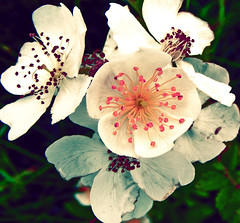
Once we get familiar with the Enneagram, we tend to characterize our behavioral patterns as by the basic attributes of each Enneagram type. Saying that if a person is aggressive or bullish they're acting like an 8, if a person is fun-loving and fleeing from pain they're acting like a 7, if a person is giving or manipulative they're acting like a 2.
But actually what the Enneagram tries to do is give you a core type and show you how all your behavioral patterns are centered around that core need, like branches on a tree that change the color of their leaves, but they're still connected to the same tree. The more developed and complex the person is, and the less set in their ways, the more varied their behavioral patterns will be--the more their wings, trifixes, variants, etc. will show.
But throughout the person's life it is easiest to see how all these variable patterns connect to the same core need--their basic Enneagram type. And through that type we can track their development process. I know many people who think that their personality actually changed due to trauma, for instance, but with the help of the Enneagram it can easily be seen as a path from integration to disintegration over the decades. That is what makes knowing your core type so useful and important.
 Enneagram Counselors vs. My Judgment
Enneagram Counselors vs. My JudgmentSo, how do I find my type? Obviously, its a long, introspective process. You don't want to be mistyped by your own misconceptions of yourself, or others' misconceptions about you, so it's best to first understand the Enneagram as a whole, from reading the books in depth, and compiling all the information you get from those who knew you when you were a small child, an adolescent, an adult, etc. Through this study, you begin to develop a picture of your usual behavioral patterns. And even though we all have some of each of the types with in us, one will obviously dominate the others. And even though two or three may be close, a real understanding of the Enneagram and yourself will help to decipher which qualities are dominant. Some people, however, may be still unable to type themselves, being too indecisive naturally to let themselves come to conclusions, or too stubborn to acknowledge things in themselves that they might like to view differently, and that is where an expert opinion is necessary.
Through my life I have engaged in much meditation and introspection in what I view to be healthy ways, ways in which I believe the back of Wisdom of the Enneagram agreed with me. I feel I have an openness to seeing myself as I am, and if I work on it, I will overcome my own misconceptions about myself, without being tricked into believing something that isn't true. Because of this I believe I was able to discern my own type after some study and interviews of my parents and close friends about how they saw me as a child. However, there are many people who are often unconsciously not as open to seeing themselves as they are, or are too uncertain in their own judgement to type themselves even when they have typed themselves correctly, and I think that these people are the most in need of expert help for determining their core type.
So how do you know if you are the type of person who just deceives yourself into thinking you are a certain type because it satisfies your ego? If you read the back of the Wisdom of the Enneagram, it outlines the steps of realizing your true self in "The Enneagram of Letting Go." From my personal development process, I profoundly agree with these steps, and have seen them active in myself at any time that I got noticeably healthier or more self-aware. The whole back of the Enneagram is also good for seeing this process. If the steps talked about seem alien to you, needless and pointless (possibly making you agitated or angry), or if they even frighten you a bit, you probably have not reached that level of health. Finding a counselor or Enneagram specialist may help you alot, if you make yourself open to them and find an empathetic and knowledgeable professional.


3 comments:
Great blog about the Enneagram!
I got one as well where I mix Enneagram with Series and Musicals..but is in Spanish...
Good Luck!
Gonschen
I thought I was a 1 for 7 days, 2 for 2 days, 4 for 3 months, 5 for 2 months, 6 for 2 weeks and 3 for a day until I found that I was an unhealthy 9 all along.
What this post says is very true. It takes a long time to actually figure out where we really stand because our personality develops several 'layers' of defenses to adapt and function.
As a 9 I think I absorbed the traits of other types, especially the unhealthy biases in order to survive and avoid conflict. I internalized in the superego many, many voices of others and made it very difficult for me to act out.
This is especially true to primary types, so see if you're one. And no matter what type we think we are, we must continue to find where we stand in the enneagram. Ultimately, examining feelings becomes a habit and an art - very fun to do!
Post a Comment